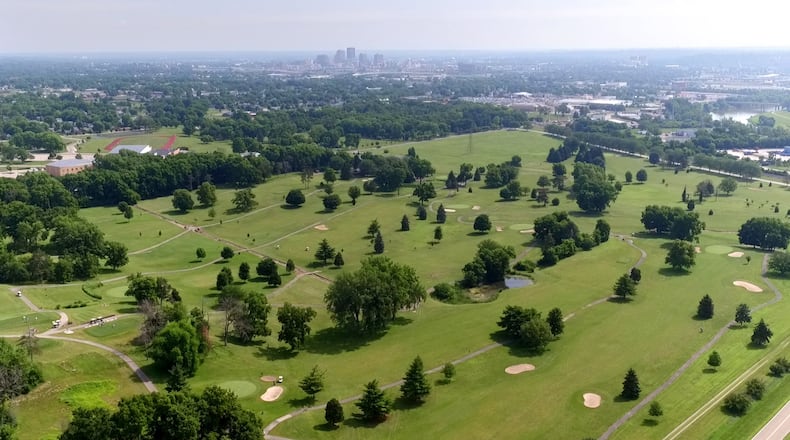Dayton wants to reduce its carbon footprint and wants to know if it can reduce electric costs at two of its largest energy-consuming facilities, said Mark Charles, Dayton’s sustainability manager.
“Not everybody who has a water and wastewater plant have a closed golf course right across the street,” Charles said.
A proposed legal settlement between the city and Dayton Power & Light (DP&L) could assist with a feasibility analysis of photovoltaic panels for the city’s water department.
The city is considering putting solar panels at Kittyhawk and Madden golf courses.
The city wants an assessment to determine how much solar technology at the properties could offset the electric use of its Water Reclamation Plant and one of its two water supply and treatment plants, Charles said.
The Miami water plant is located at 3210 Chuck Wagner Lane, across the street from Kittyhawk. The wastewater plant, 2800 Guthrie Road, is across the street from Madden.
The city earlier this year announced it was closing the golf facilities to save money.
If studies conclude solar panels are technically and financially feasible at one or both of the golf courses, city staff will begin discussions with impacted neighborhoods to gauge their level of interest in the projects, Charles said.
“We have a long way to go in this process,” he said.
A sustainability strategy endorsed by the Dayton City Commission earlier this year calls for exploring using the golf courses as solar farms.
The strategy says the city might be able to avoid nearly all of the upfront capital costs of the projects by entering into a purchase power agreement with solar installers.
On Wednesday, the Dayton City Commission will vote on a stipulated agreement with DP&L that could help with solar assessments.
DP&L has agreed to invest $249 million in capital projects in the next four years to modernize its electric grid. The company has agreed to take steps and pay for projects that benefit Dayton customers, including new smart thermostats and upgraded utility meters.
The settlement resolves several cases, all of which involve DP&L rates, and it was signed by 20 parties as a reasonable resolution to the various disputes, said Barbara Doseck, Dayton’s law director.
DP&L has agreed to provide non-financial technical support for all studies related to the solar projects at the water and wastewater plants, such as a feasibility study, system-impact study and facilities study, according to the stipulated agreement.
Under the agreement, DP&L would agreed to waive all fees or costs associated with the studies, and the company also would agree to help with “net metering” issues.
The city is exploring a variety of different reuse options for the golf courses. But they have some redevelopment challenges and limitations, city officials say.
Kittyhawk sits atop a sensitive part of the wellfield, which significantly restricts reuse possibilities.
Madden’s proximity to the wastewater plan means unpleasant smells are common and the property may have limited redevelopment interest.
Charles said the city hopefully will make a decision about whether to move forward with the solar projects in the spring.
It’s unclear how much of the golf courses could contain solar panels.
Kittyhawk Golf Center is about 420 acres and Madden Golf Course is about 165 acres.
This amount of available land means Dayton could build a very large municipal solar array, said Meg Maloney, a University of Dayton graduate student who is interning with the city’s the sustainability office.
Last year, Cincinnati announced it is constructing the largest municipal solar array in the nation.
The city said the 100 megawatt solar farm will be installed on about 1,000 acres of land about 40 miles east of downtown in Highland County.
Dayton also expressed interest in encouraging the owner of Valleycrest landfill in Old North Dayton to consider pursuing solar panels on the 102-acre property, when the final cap is put on the site, officials said.
The city also is exploring putting solar arrays on top of city buildings to help reduce their electric use, officials say.
About the Author



